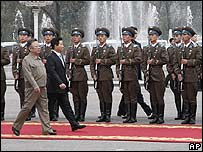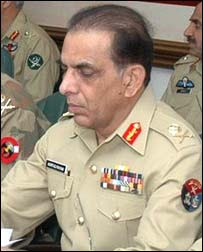 Tuesday, 2 October 2007
Tuesday, 2 October 2007
North Korea's reclusive leader Kim Jong-il has welcomed South Korean President Roh Moo-hyun to Pyongyang for a historic summit.
Live television footage showed the two men shaking hands ahead of three days of talks in the North Korean capital.
The summit between the two leaders is only the second such meeting in more than 50 years since the Korean war.
President Roh said he was aiming for a "peace settlement together with economic development".
The 1950-53 war between the two sides has never formally ended, but Seoul has promoted hopes for a permanent truce.
It says this summit may pave the way for that historic step.
Historic crossing
President Roh left the South Korean capital, Seoul, in a motorcade along with business leaders, bureaucrats, poets and clerics.  The convoy stopped at the demilitarized zone to allow the president and his wife, Kwon Yang-sook, to cross into the North on foot - the first time a South Korean leader has ever done this.
The convoy stopped at the demilitarized zone to allow the president and his wife, Kwon Yang-sook, to cross into the North on foot - the first time a South Korean leader has ever done this.
They stepped across a yellow plastic tape, printed with the words "peace" and "prosperity".
"I do hope after my crossing that more people will follow suit," said President Roh at the border. "This line will gradually be erased and the wall will fall."
Arriving in Pyongyang, he was greeted by Mr Kim, who was wearing his trademark khaki jumpsuit, in front of crowds who cheered and waved paper flowers.
Mr Roh has now gone to a state guesthouse where he will stay for the course of the summit. He is expected to hold formal talks with Mr Kim on Wednesday.
Economic aid
The two states' only other summit was held in Pyongyang in 2000.
At the time, Kim Jong-il promised to make the return journey to Seoul, but that has never happened.
The first summit led to the former South Korean President Kim Dae-jung winning the Nobel Peace Prize for his "sunshine policy" of rapprochement with the North.
Since then, rail and road links have been built, although there has only been one, symbolic border rail crossing. Families divided between the two countries have also been granted reunions, if only briefly.
But critics say the South's attempts at friendship and large donations of aid have failed to break down the impoverished North's isolationism or improve its human rights record.
Some observers doubt whether Kim Jong-il has any appetite for reconciliation, says the BBC's John Sudworth in Seoul.
They believe he prefers to keep his military threat to coax further economic aid and other concessions from the nervous South, our correspondent says.
The South Korean leader, meanwhile, has been accused of using the summit to boost his popularity.
Mr Roh is approaching the end of his term of office and the conservative opposition are leading in opinion polls ahead of elections in December.
They have warned Mr Roh against making any "naive" economic concessions just for the sake of an agreement.
"They must know that an emotional approach to the North would bring on disasters," spokeswoman Na Kyung-won said.
No official agenda has been announced for the talks, but one item that is not expected to be discussed is North Korea's nuclear weapons programme. That is being left for ongoing multi-party talks, which made significant progress over the weekend.
A joint statement setting out the next step in the denuclearisation progress was agreed, and has been sent for approval to the six governments involved, including the two Koreas.
Korean leaders in historic talks
Categories: Asia-Pasific, Headline News, World News
Musharraf appoints army successor
 Tuesday, 2 October 2007
Tuesday, 2 October 2007
Pakistan's President Pervez Musharraf has named his successor to take over as army chief, the military says.
The appointee is former head of intelligence Lt Gen Ashfaq Pervez Kiani, military spokesman Maj Gen Waheed Arshad told the BBC.
Gen Musharraf will resign as head of the army if he wins presidential elections on Saturday, his lawyers say.
Opposition parties say his candidacy is illegal and that he has broken previous promises to resign as army chief.
Lt Gen Kiani has been appointed deputy chief of army staff and will take over the top post when it falls vacant, the military says.
It is not clear when that will be.
Gen Musharraf's lawyers told the Supreme Court last week that he would stand down as army chief "soon after election and before taking the oath of office as president".
Lt Gen Kiani headed Pakistan's notorious Inter-Services Intelligence agency from 2004 until last month.
He took part in secret talks recently on a possible power sharing deal between President Musharraf and former PM Benazir Bhutto.
His appointment will be closely watched in Washington which has been putting pressure on Pakistan to do more in the US-led "war on terror".
Boycott
The BBC's M Ilyas Khan in Karachi says Lt Gen Kiani earned Gen Musharraf's confidence when he headed the investigation into two attempts on the president's life in December 2003, bringing a number of suspects to trial in a secret military court.
News of his appointment came as scores of opposition MPs resigned from Pakistan's national parliament and provincial assemblies in protest at Saturday's presidential election.
They insist that President Pervez Musharraf is ineligible to stand.
Correspondents say that the resignations make it even more certain that Gen Musharraf will win the vote.
Members who resigned from the assemblies on Tuesday were drawn mainly from the alliance of Islamic parties, the MMA, and the PML-N party of former Prime Minister Nawaz Sharif.
"We are handing over the resignations today because we consider the election of the president is illegal and unconstitutional," one leading MP, Liaquat Baloch, said, the AFP news agency reports.
The MPs hope the resignations will make the presidential election be seen to be meaningless.
"This is the first step to discredit the election process," said former cricket star and MP Imran Khan, whose party is part of the opposition APDM alliance.  The country's biggest party is the Pakistan People's Party (PPP) of former Prime Minister Benazir Bhutto. It is not taking part in the boycott.
The country's biggest party is the Pakistan People's Party (PPP) of former Prime Minister Benazir Bhutto. It is not taking part in the boycott.
Meanwhile two rival candidates for Saturday's election have filed fresh petitions in the Supreme Court against Gen Musharraf's candidacy.
Last Friday the court dismissed a number of petitions, in a move seen as a major victory for the president.
The president is elected by MPs from the national assembly and Pakistan's four provincial assemblies.
The petitions filed by lawyers representing two candidates standing against President Musharraf, retired Judge Wajihuddin Ahmed and Makhdoom Amin - vice chairman of the PPP - say that the president is not eligible to stand while also remaining head of the army.
Categories: Headline News, South Asia, World News






